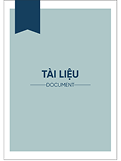Tài liệu
The effect of internal control on tax avoidance : the case of Indonesia

Xem mô tả
159
Xem & Tải
3
Tóm tắt
Purpose – The purpose of this paper is to analyze the effect of internal control on tax avoidance analyzing internal (family ownership) and external (environmental uncertainty) factors on the effectiveness of internal control in preventing tax avoidance. Design/methodology/approach – First, the authors examine the direct effect of the effectiveness of internal control on tax avoidance. Second, thea uthors examine the effect of moderation of family owner ship And environmental uncertainty on the relationship of the effectiveness of internal control on tax avoidance. Third, the authors divide the full sample into two groups, high and less effectiveness of internal control to examine the direct effect of internal control effectiveness on tax avoidance and when considering mode rating variables. Fourth, the authors use two different measures of the effectiveness of internal control. Findings – This research found that effective internal control can reduce tax avoidance. Family ownership affects the relationship between internal control and tax avoidance, but environmental uncertainty does not influence the relationship between internal control and tax avoidance. Practical implications – Internal control increases compliance with rules and policies, socompanies Must design and implement effective internal control to prevent tax avoidance activities inviolation of tax regulations. Originality/value – In contrast to previous studies, this study measures the effectiveness of internal control using the index of internal control practice disclosure and considers internal and external factors that can affect the effectiveness of internal control to prevent tax avoidance.
Mô tả
international business administration
Tác giả
Ire nius Dwinanto Bimo
Christianus Yudi Prasetyo
Caecilia Atmini Susilandari
Người hướng dẫn
Nơi xuất bản
Nhà xuất bản
Kinh Tế Quốc Dân
Năm xuất bản
2019
ISBN
1956-0020
ISSN
Từ khóa chủ đề
Business , Internal control , Tax avoidance , Family ownership , Environmental uncertainty
Trích dẫn
Bộ sưu tập
Tệp tin

10-1108_JED-10-2019-0042.pdf
D:\NEU_DSpace\tapchitienganh
Dung lượng: 162.5 KBĐịnh dạng: pdf
Lượt xem: 1 Lượt tải: 2
